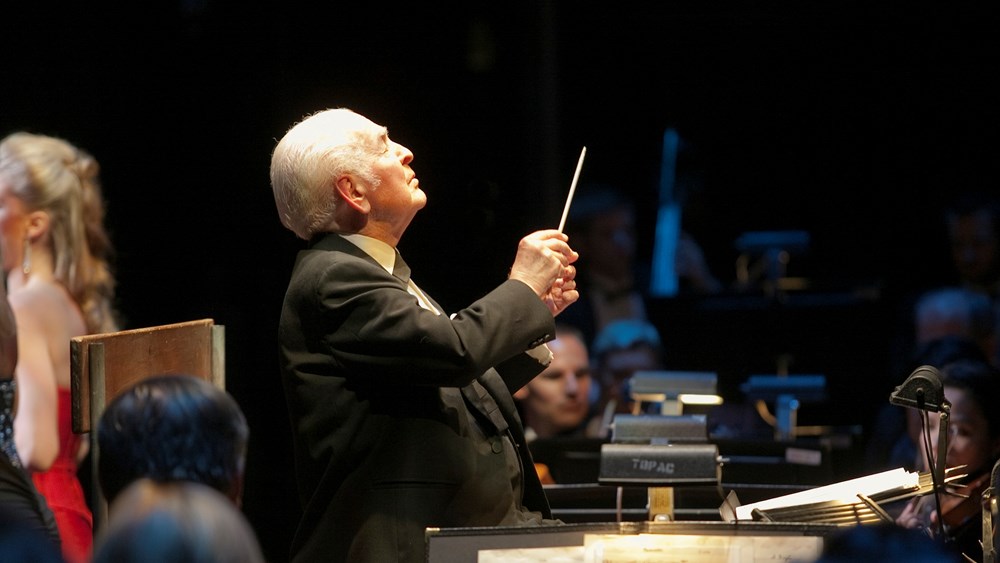Anton Coppola's Century of Opera

Director Sofia Coppola had never staged an opera before she got the assignment to mount La traviata at the Rome Opera. But she knew she could get advice from a terrifically authoritative source: her great-uncle, composer/conductor Anton Coppola.
“She came over one afternoon, and I went over every detail with her,” the elder Coppola says. “I told her that opera is the most artificial form of theatrical expression there is. People are singing instead of talking! Not only singing, but facing a sonic wall called the orchestra. That’s ridiculous! In a movie, they’ve got a mic over their heads, but in opera the hero can’t look at the heroine when he says ‘I love you’ — he has to face the audience. Opera cannot be based in reality. You can try to make it as realistic as possible, but always within the confines of sonority.” Sofia took her uncle’s advice to heart, and her lavish Traviata, with costumes by Valentino, sold out its 16-performance run.
“I’ve always been fascinated by the theatrical aspects of music, which means opera,” Coppola says. As a boy, he would check out opera scores from the public library to play them at home. His professional involvement with opera began when he was nine and joined the Met’s children’s chorus, singing in the American premiere of Turandot. As a teenager, he found a mentor in the Met conductor Gennaro Papi, who had served as a rehearsal pianist for Puccini. Coppola would watch Papi conduct at night and then the next day head over to his apartment to learn why and how the maestro had made his interpretive decisions.
“It was an education you can’t buy,” says Coppola. “Papi would let me in on things that Puccini would tell him in the course of rehearsals — intimate details that don’t appear in the score. He told me he’d be playing something and Puccini would come, put his arm around his shoulder and say: ‘Play that a little faster. Never mind the metronome marks; I wrote those 30 years ago.’ I was getting this right from the horse’s mouth.”
At age 18, Coppola got a job with the Works Progress Administration, working with conductor Fulgenzio Guerrieri to bring opera to all five boroughs of New York City. “The WPA was one of the greatest things FDR did,” Coppola says. “It gave work to everybody, whether you were a plumber or a carpenter or a bricklayer or an actor or a musician. I was Guerrieri’s assistant, his gofer — I’d do anything he wanted me to do. He was brilliant, but he had a weakness: He was a wino. He had prepared Samson et Dalila, and he had already done four performances. The last one was a Sunday matinee, but he called me on that morning and said, ‘I just can’t make it — please go on for me.’” That 1936 Samson marked Coppola’s conducting debut, at 18 years old.
During World War II, Coppola led an army band and then emerged to work with the touring San Carlo Opera Company. A period in mainstream showbiz included a stint at Radio City Music Hall, where he met his wife, dancer Almarinda Drago. In 1954, he led Julie Andrews in The Boy Friend, her Broadway debut. He conducted at companies across the U.S., including San Francisco Opera and New York City Opera. In 1996, he became founding artistic director of Opera Tampa, which in 2001 presented the world premiere of his opera Sacco and Vanzetti.
This March, Coppola reaches a significant milestone: his 100th birthday. In celebration of the occasion, he’ll head down from New York to lead Opera Tampa forces in a program of his own music, including excerpts from Sacco and Vanzetti, along with a tone poem he composed last year in honor of his nephew, director Francis Ford Coppola, called Fa-Fa-Do (FFC). The March 25 concert will mark the first time in history that a centenarian has led an orchestra in performance.
“I see this concert as a final statement, as complete as I can make it,” Coppola says. “It’ll be an overwhelming event, giving me the satisfaction of fulfilling my duty as a musician in this life.”
This article was published in the Winter 2017 issue of Opera America Magazine.

Fred Cohn
Fred Cohn is the former editor of Opera America Magazine.




